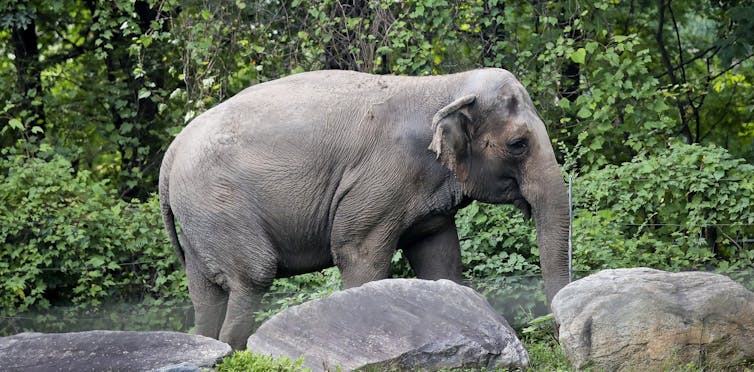comment: legal definition of person
Comment: The legal definition of ‘person’ is still evolving
Published on: 7 January 2021
Writing for The Conversation, Joshua Jowitt discusses how the case of Happy the elephant has highlighted issues surrounding the definition of legal personhood.

Joshua Jowitt, Newcastle University
Nobody knows how old Happy is. Sometime in the 1970s, she and six other youngsters were taken from their family group (probably in Thailand) and sold to an entertainment complex in California where they were forced to perform for paying guests. Over time, Happy was separated from her kin and, since 2006, has lived alone in conditions that experts suggest could significantly increase her risk of arthritis, depression, bone disease and a host of other physical and mental ailments.
A team of lawyers requested a writ of habeas corpus – a claim of unlawful detention – on Happy’s behalf in an effort to have her rehomed. But on December 17 2020, an appeals court in New York denied the claim. Their reasoning was simple – Happy cannot claim legally enforceable rights under existing law. This is because Happy is an elephant.
If Happy had been human, the courts wouldn’t have hesitated to find in her favour, and people would consider this justified. But do we actually have reason to think any differently now we know she is an elephant? Does justice require different things for different species in the same circumstances? Or, as the Nonhuman Rights Project – a civil rights association campaigning for animal legal rights in the US – has argued on Happy’s behalf, is a subject’s species irrelevant in considerations of justice and legal rights?
If the Nonhuman Rights Project is correct here, then the courts need to recognise Happy as a legal person to hear her case. This is necessary because, according to a legal principle created by the ancient Romans but which is still with us today, someone – or thing – needs to be recognised as a “legal person” in order to be able to claim legal rights – and it’s a status currently denied to non-human animals in the US.
Legal personhood shouldn’t be confused with the ordinary meaning of what it means to be a “person”. Non-living entities such as idols, corporations or even ships have long been recognised as legal persons in legal systems worldwide. This means that, if non-living things have had their legal personhood recognised in the past, there should be no conceptual problem with recognising the legal personhood of a highly intelligent being such as Happy.
But this would be a controversial legal shift with huge implications for animal rights. The New York Court refused to wade into the debate and issued a statement saying that integrating other species into legal constructs designed for humans is a matter “better suited to the legislative process”.
In other words, extending legal personhood needs to be fully thought through and legislated for by Congress, not declared by the courts. In deciding this, the appeals court concurred with several cases from across the US that reached the same conclusion, from the whales and dolphins denied compensation for disturbances caused by Navy sonar, to the macaque monkey deemed not to be entitled to copyright protection for a selfie it took.
Letting politicians instead of judges deliberate the recognition of new legal persons might seem a sensible approach. It’s one that was recently taken by the New Zealand parliament when it voted to recognise a river as such. But the US Congress and other legislatures are usually reluctant to recognise new categories of legal persons unless their hand is forced.

After all, legislatures once turned a blind eye as many human beings were denied the status of legal persons based on their age, sexuality, religion, gender or race. The institution of slavery relied on legal systems denying the legal personhood of human beings, and it was the courts – most notably the Somerset case, heard in England in 1772 – that challenged this, long before slavery was abolished through legislation.
Legal precedent
The problem for Happy, then, is that new legislation to benefit her is unlikely given that the issue is considered a low priority – if it’s even on the political radar at all. So any court presented with a case like Happy’s must face a choice – either do nothing and maintain Happy’s suffering, or force the legislature’s hand by following the lead of other legal systems.
Courts in Argentina have recognised the legal personhood of Cecilia the Chimpanzee, who was detained in similar conditions to Happy. Chucho the Bear, also held in similar conditions, is a legal person too thanks to the Columbian Courts. Both were granted habeas corpus relief from their inhumane captivity as a result.
The New York courts will be confronted with this choice again. Happy’s legal team intend to appeal, and in doing so may bring the case into the orbit of a judge more sympathetic to this kind of activism. The last time an animal personhood case (about chimpanzees) reached the more powerful appellate level in New York, Judge Fahey noted that:
The issue [of] whether a nonhuman animal has a fundamental right to liberty protected by the writ of habeas corpus is profound and far-reaching… Ultimately, we will not be able to ignore it. While it may be arguable that a chimpanzee is not a person, there is no doubt that it is not merely a thing.
If one judge thinks this, then they may not be alone. The New York Court of Appeal may yet acknowledge the elephant in the room and provide a happy ending, with stronger legal rights for non-human animals across the US.
Joshua Jowitt, Lecturer in Law, Newcastle University
This article is republished from The Conversation under a Creative Commons license. Read the original article.



